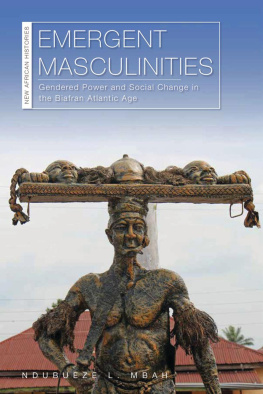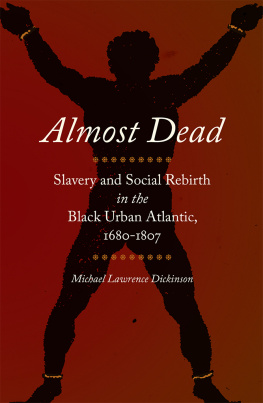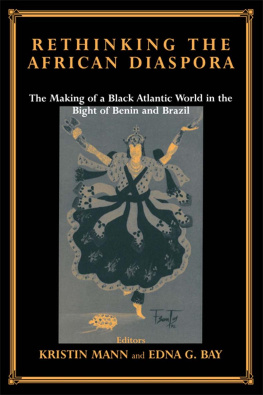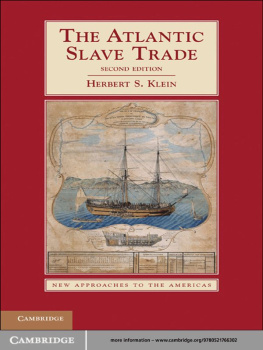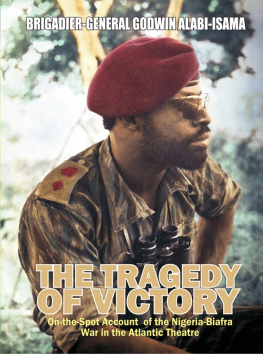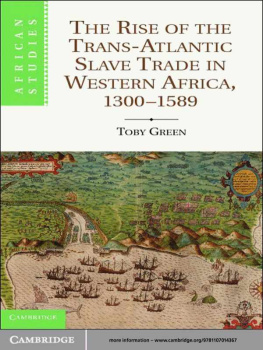Emergent Masculinities
NEW AFRICAN HISTORIES
SERIES EDITORS: JEAN ALLMAN, ALLEN ISAACMAN,
AND DEREK R. PETERSON
David William Cohen and E. S. Atieno Odhiambo, The Risks of Knowledge
Belinda Bozzoli, Theatres of Struggle and the End of Apartheid
Gary Kynoch, We Are Fighting the World
Stephanie Newell, The Forgers Tale
Jacob A. Tropp, Natures of Colonial Change
Jan Bender Shetler, Imagining Serengeti
Cheikh Anta Babou, Fighting the Greater Jihad
Marc Epprecht, Heterosexual Africa?
Marissa J. Moorman, Intonations
Karen E. Flint, Healing Traditions
Derek R. Peterson and Giacomo Macola, editors, Recasting the Past
Moses E. Ochonu, Colonial Meltdown
Emily S. Burrill, Richard L. Roberts, and Elizabeth Thornberry, editors, Domestic Violence and the Law in Colonial and Postcolonial Africa
Daniel R. Magaziner, The Law and the Prophets
Emily Lynn Osborn, Our New Husbands Are Here
Robert Trent Vinson, The Americans Are Coming!
James R. Brennan, Taifa
Benjamin N. Lawrance and Richard L. Roberts, editors, Trafficking in Slaverys Wake
David M. Gordon, Invisible Agents
Allen F. Isaacman and Barbara S. Isaacman, Dams, Displacement, and the Delusion of Development
Stephanie Newell, The Power to Name
Gibril R. Cole, The Krio of West Africa
Matthew M. Heaton, Black Skin, White Coats
Meredith Terretta, Nation of Outlaws, State of Violence
Paolo Israel, In Step with the Times
Michelle R. Moyd, Violent Intermediaries
Abosede A. George, Making Modern Girls
Alicia C. Decker, In Idi Amins Shadow
Rachel Jean-Baptiste, Conjugal Rights
Shobana Shankar, Who Shall Enter Paradise?
Emily S. Burrill, States of Marriage
Todd Cleveland, Diamonds in the Rough
Carina E. Ray, Crossing the Color Line
Sarah Van Beurden, Authentically African
Giacomo Macola, The Gun in Central Africa
Lynn Schler, Nation on Board
Julie MacArthur, Cartography and the Political Imagination
Abou B. Bamba, African Miracle, African Mirage
Daniel Magaziner, The Art of Life in South Africa
Paul Ocobock, An Uncertain Age
Keren Weitzberg, We Do Not Have Borders
Nuno Domingos, Football and Colonialism
Jeffrey S. Ahlman, Living with Nkrumahism
Bianca Murillo, Market Encounters
Laura Fair, Reel Pleasures
Thomas F. McDow, Buying Time
Jon Soske, Internal Frontiers
Elizabeth W. Giorgis, Modernist Art in Ethiopia
Matthew V. Bender, Water Brings No Harm
David Morton: Age of Concrete
Marissa J. Moorman, Powerful Frequencies
Ndubueze L. Mbah, Emergent Masculinities
Patricia Hayes and Gary Minkley, editors, Ambivalent
Judith A. Byfield, The Great Upheaval
Mari K. Webel, The Politics of Disease Control
Kara Moskowitz, Seeing Like a Citizen
Ohio University Press, Athens, Ohio 45701
ohioswallow.com
2019 by Ohio University Press
All rights reserved
To obtain permission to quote, reprint, or otherwise reproduce or distribute material from Ohio University Press publications, please contact our rights and permissions department at (740) 593-1154 or (740) 593-4536 (fax).
Printed in the United States of America
Ohio University Press books are printed on acid-free paper

29 28 27 26 25 24 23 22 21 20 195 4 3 2 1
Library of Congress Cataloging-in-Publication Data
Names: Mbah, Ndubueze L., 1985- author.
Title: Emergent masculinities : gendered power and social change in the Biafran Atlantic age / Ndubueze L. Mbah.
Description: Athens : Ohio University Press, 2019. | Includes bibliographical references and index.
Identifiers: LCCN 2019028629 | ISBN 9780821423882 (hardcover) | ISBN 9780821423899 (paperback) | ISBN 9780821446850 (pdf)
Subjects: LCSH: Sex role--Nigeria, Eastern--History. | Slave trade--Social aspects--Nigeria, Eastern. | Slave trade--Political aspects--Nigeria, Eastern. | Masculinity--Social aspects--Nigeria, Eastern. | Igbo (African people)--Africa, Eastern--Social life and customs.
Classification: LCC HQ1075.5.N6 M33 2019 | DDC 305.3096694--dc23
LC record available at https://lccn.loc.gov/2019028629
Preface and Acknowledgments
This project has evolved from a dissertation on Ohafia-Igbo gendered sociopolitical transformations between 1850 and 1920 into a broader historical ethnography of gendered Atlanticization in the Bight of Biafra and West Africa between 1750 and 1920. I am indebted to the generous support of many people and institutions. Funded by a Wenner-Gren Fieldwork Grant, I conducted much of the original research between 2010 and 2012, including 170 oral interviews with Ohafia-Igbo men and women as well as archival research at the Nigerian National Archives, British National Archives, and National Library of Scotland. Emergent Masculinities was conceived amid a vibrant Africanist intellectual community at Michigan State University, where Dr. Peter Alegi directed my general African historiography, Dr. Walter Hawthorne introduced me to a rapidly maturing field of African slavery and Atlantic history, and Dr. James Pritchett guided me through the robust field of African anthropology. This enabled me to situate the Ohafia-Igbo within the scholarship on the south-central African matrilineal belt and to foreground the sociopolitical and ideological conflicts among individuals, and between individuals and structures, as pivotal to gendered social transformations. Most importantly, in addition to very generous graduate mentorship, Dr. Nwando Achebe imparted a rigorous Afro-feminist methodology that enabled me to question prevailing assumptions that patriarchy and egalitarian social norms were timeless features of Igbo culture and history. Thank you Professor Achebe and Professor Folu Ogundimu for providing me a home at MSU. Daalu!
The dissertation had revealed the distinctive dual-sex sociopolitical systems of the Ohafia-Igbo, where women developed and maintained relatively more powerful institutions of political rulership, constituted a class of agrarian breadwinners, and were central to the social reproduction of the dominant matrilineage systems until the second half of the nineteenth century. Examining what such a system meant for Ohafia-Igbo men required reconciling diverse gendered local narratives with the literature on female power and authority in West Africa, as well as with the nascent scholarship on African masculinities. The scholarship of Ifi Amadiume, Sandra Greene, Nwando Achebe, Ugo Nwokeji, Emily Osborne, and Stephan Miescher inspired me to explore how the Atlantic slave trade and its repercussions facilitated Biafran male dominance in cash crop productive and exchange economies, Biafran mens mobilization of missionary and colonial institutions, and Biafran womens contestation of marginalization through slaveholding, slave and commodity trading, politicized divination, and the practice of becoming female husbands. It was thus necessary to situate the novel forms of masculinity, femininity, and sexuality that became prominent in the early twentieth century within a

